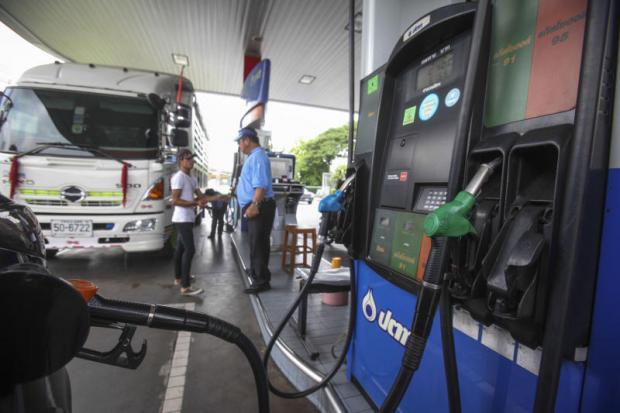
The Energy Ministry plans to use both biodiesel B10 and B7 at petrol stations nationwide from the end of May.
B10 contains 10% methyl ester (ME) from crude palm oil, combined with diesel.
The combination available at petrol stations now is B7, with 7% ME.
Minister Siri Jirapongphan said most diesel-based vehicles are compatible with B10, such as pickups, trucks and buses.
Some 80% of diesel-powered vehicles on local roads are made and assembled by Japanese companies, Mr Siri said.
"European and US brands are not B10 compatible," he said.
Mr Siri said policymakers plan to discuss this matter with relevant stakeholders, including oil traders, ME makers and car assemblers, aiming to make B10 the preferred diesel fuel within a planned time frame.
"Incentives to encourage motorists to shift to B10 will be announced soon, such as a lower retail price and a collection of a levy and tax," he said.
"The pilot period for B10 does not require European and US brands to comply with regulations."
Local petrol stations will have three types of biodiesel -- B7, B10 and B20 -- and three types of gasoline -- gasohol E10, E20 and E85, said Mr Siri.
He said once B10 becomes the preferred choice, it will use 2.5 million tonnes a year of crude palm oil, up from 1.4 million tonnes used for B7.
The Energy Business Department also recently announced B20 will be available nationwide.

A pickup parked at a local petrol station. Pattarapong Chatpattarasill
Toyota and Isuzu are ready to manufacture vehicles that accept B20 fuel and they want to support the government's initiative to tackle air pollution.
Pickups that are either Euro 5- and B20-compatible can enjoy an excise tax discount of 0.5-2%, depending on sizes and segments.
On Monday, Toyota announced new pickups have already lowered their prices by 3,000-13,000 baht from April 9.
The department will talk with ME producers to improve the wax content by bringing monoglyceride levels to below 0.4% in weight, while water content should be below 200 parts per million in line with concerns of the Japan Automobile Manufacturers Association.
B20 is expected to be popular with truck drivers because it costs five baht less per litre than B7.
The push to promote B10 and B20 is aimed at absorbing the huge surplus of crude palm oil, which sits at 2 million tonnes. Some 1 million tonnes a year are used for cooking oil and 1.4 million tonnes for B7.
The Thailand Oil Palm Board estimates crude palm oil output will rise to 3 million tonnes this year from 2.5 million tonnes in 2018 and 2 million tonnes in 2017.
Mr Siri said B20 is expected to absorb 2 million tonnes of crude palm oil, effectively reducing the surplus to zero.